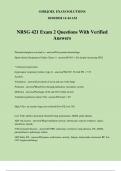©SIRJOEL EXAM SOLUTIONS
10/10/2024 11:44 AM
NRSG 421 Exam 2 Questions With Verified
Answers
Placental abruption can lead to - answer✔Post-partum hemorrhage
Hypovolemic Respiratory Failure (Type 1) - answer✔PAO2 < 60, despite increasing FIO2
* refractory hypoxemia
hypercapnic respiratory failure (type 2) - answer✔PaCO2> 50 with PH < 7.35.
Acidosis
Ventilation - answer✔movement of air in and out of the lungs
Perfusion - answer✔Blood flow through pulmonary circulatory system
Diffusion - answer✔Exchange of 02 and CO2 within alveoli
Ventilation perfusion ration V/Q - answer✔Normal = 4/5
High V/Q = air reaches lung, but no blood flow (PE, low CO)
Low V/Q= airflow decreased, blood flowing (pneumonia, ARDS, pulm edema)
ARF risk factors - answer✔Hypoventilation (airway, obstruction, muscle weakness, injury,
anesthesia, opioid)
V/Q mismatch diseases - answer✔COPD, atelectasis, restrictive, lung diseases, PE, ARDS,
pneumothorax, pulmonary edema
ARF Early S/S - answer✔Dyspnea, restlessness, anxiety, fatigue, tachycardia, increased, BP, low
CO2 (hyperventilating)
, ©SIRJOEL EXAM SOLUTIONS
10/10/2024 11:44 AM
ARF Intermediate S/S - answer✔Confusion, pinker, skin, tone, lethargy due to increase CO2
ARF Late S/S - answer✔Cyanosis/unresponsiveness
ARF diagnosis - answer✔-ABGs
-CXR
*hypercapnia=late sign
ARF treatment - answer✔treat underlying condition
NPPV: CPAP/BiPAP
Mechanical ventilation
ARDS - answer✔Inflammatory condition secondary to another problem
Non-cardiogenic pulmonary edema
Onset: <7 days
Diagnosis: chest X-ray (white out), PAO2/FiO2=<200
Direct ARDS Causes - answer✔aspiration, chest, trauma, pneumonia, pulmonary contusion,
inhalation injury, pulmonary embolus
InDirect ARDS Causes - answer✔Sepsis/shock, pancreatitis, burns, blood, transfusions,
transfusion related acute lung injury, cardiopulmonary bypass, drug/alcohol overdose
ARDS P/F ratio - answer✔Mild= 200-300
Moderate= 100-200
Severe=<100




